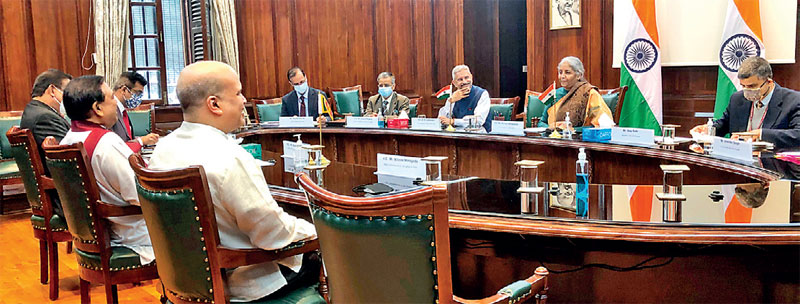Sunday Feb 15, 2026
Sunday Feb 15, 2026
Monday, 13 December 2021 00:45 - - {{hitsCtrl.values.hits}}

Finance Minister Basil Rajapaksa’s move to initiate a dialogue with our immediate neighbour India is an extremely wise and timely move in keeping with the important components of governance principles of diplomacy
 Events become more important and focused in the context of their after-effects. Criticism levelled beforehand will only be conjectures yet to become realities. Diplomatic initiatives demonstrate how a small neighbour state can successfully move towards a pro-active bilateral relationship interacting with other countries in the neighbourhood ‘or’ even in the region, within the confines of available economic space.
Events become more important and focused in the context of their after-effects. Criticism levelled beforehand will only be conjectures yet to become realities. Diplomatic initiatives demonstrate how a small neighbour state can successfully move towards a pro-active bilateral relationship interacting with other countries in the neighbourhood ‘or’ even in the region, within the confines of available economic space.
Finance Minister Basil Rajapaksa’s move to initiate a dialogue with our immediate neighbour India is an extremely wise and timely move in keeping with the important components of governance principles of diplomacy. This is so, considering the essential need for reaffirming the mutual trust between the two states and how a nation could act with a drive to become relevant, influential and acceptable in its bilateral relations with another big country, especially when the latter is playing a significant role in quickly transforming itself into a fast-growing nation in the global scenario. It appears that the move and the conclusions reached awaiting finalisation is a disposition of trust and confidence vital for the mutual national interests of both countries.
The growing economic strain we are experiencing right now is compelling us to look for immediate relief measures to seek remedies which do not affect our core interests due to interactions with powerful players. The choice of non-controversial scopes is also an important factor being mindful of the credibility issues and long-term effects while addressing short-term relief as a priority in such accords.
Let us now examine the areas of concern and the basis of understanding to be reached as already announced in a media release about the Finance Minister’s proposals from our side. It also has to be acknowledged that this early release of the relevant information will dispel any scepticisms and avoid misrepresentations and distortions.
i. Food and health security package on an urgent basis that would envisage the extension of a line of credit to cover the import of food, medicines and other essential items from India to Sri Lanka.
It needs no emphasis to explain the essential nature of food imports from India to our day-to-day food requirements. India has been a main source for several items of a staple nature over a long period and any disturbance to this line of supply will be critical to the daily routines of our people. Sri Lanka’s trade share with India alone is approximately $ 2.5 billion per year. Food items and medical supplies largely account for our imports from India. Funding imports is a problem due to the prevailing depleted balances in our foreign exchange resources. Hence the negotiation of a facility on extended payment terms for the (imported) supply of these items becomes extremely important to prevent any shortfall or disruption in the supply of essential drugs and consumer food items.
ii.Energy Security Package that would include a line of credit to cover import of fuel from India, and an early modernisation of Trincomalee tank farm
Fuel and energy are so vital to our day-to-day lives. We do not have any access to Crude Oil supplies or refined oil other than importing them. Our annual Fuel Import Bill is averaging between $ 3,800 to 4,000 million.
A day’s black out in the supply of electricity in the country which we experienced very recently indicated how essential it is to have a smooth supply of uninterrupted electricity supply. Besides the denial of the luxuries of air-conditioning, instant lighting, lift-systems, building escalators we saw the water supply too getting affected in certain areas raising alarm signals. Hospitals, operation theatres and even traffic light signals were disturbed. While the public cannot condone any action upsetting their daily routines the power failure signalled a severe warning to all about the need to run it as an essential public service. Fuel is a predominant factor playing an important part in the energy supply equation.
In a situation where our Reserve balance has gone below $ 1.4 billion, we have to take adequate safe guards in maintaining the supply position considering it as a national priority.
The Finance Minister’s choice of approaching India becomes appropriate due to many reasons particularly to address our fuel issue with Indian support. The two countries already have an ongoing business relationship in the field of fuel supply in the country. India is very advanced in the oil refinery industry and it is interesting to examine their involvement in the fuel industry.
Petroleum refining
With a total refining capacity of 69.2 million tonnes per year, the state-owned Indian Oil Corporation was the largest refiner in the country by capacity. Indian Oil’s refineries processed 69.001 MMT of crude oil in 2017-18.
In September 2021 the total installed capacity of the oil refinery industry stood at 246.9 million metric tons and their crude oil production was 32.2 MMT in addition to their importing volume of 4.54 million barrels.
India aims to commercialise 50% of its strategic petroleum reserves to raise funds and build additional storage tanks to offset high oil prices.
This gives a clear picture of the oil industry of our neighbouring country. There is a big potential arising out of the need to increase their crude oil storage facilities.
And this provides an ideal opportunity to put into best use of our gold valley in the form of a dormant oil tank farm located in a unique strategic geographical positioning in Trincomalee.
There is a strong possibility for a highly win-win situation for both countries to gain advantages from a suitable agreement.
Sri Lanka should use all its bargaining skills to enter into an agreement where the price fluctuations of oil products is given due consideration, for both countries to share the benefits in a fair manner with due weightage given to our sovereign ownership of the golden property.
At this moment I recall the rubber/rice agreement we reached many years ago and the basic concepts and principles underlying that agreement such as the consideration of a discounted price for the rice on account of the exclusive supply arrangement we tied ourselves into. In a similar gesture our oil tanks could be the pivotal focus for a special price for our domestic consumption requirements of fuel.
iii. Offer of a currency swap to help Sri Lanka address the current balance of payments issues;
India has given us such support and help several times and with the economic package that is in the centre of the negotiations it will not be difficult for the Reserve Bank to consider this in our favour.
iv. Facilitating Indian investments in different sectors in Sri Lanka that would contribute to growth and expand employment. This will build on recent trends in that respect.
We have to recognise the technological advancement India has made both in the fields of industry and agriculture helping them to a high position of placement in the order of GDP growth rates, occupying the highest place in Asia. Their experience, progressing technical advancement, closeness of our geographic locations in addition to our traditional and historic cultural relations will be to the mutual advantage of both countries to be taken into seriously in reaching an accord. There are several areas of harnessing the resourcefulness of both countries to share the values in offering unique services in many fields hitherto unexploited.
All these will no doubt pave way for a rational settlement of any minor prickly issues that we may have had between the two countries due to geo-political alienations. Nevertheless, we have continued our relationship with India all these years with a history of sacrifices and commitment each country has extended on many controversial issues. Sri Lanka’s involvement during the period of Sirimavo Bandaranaike to intervene in the Indo-China conflict, our accords with India on the migrant Indian labour and Kachchitive island matter are memorable milestones in this regard.
We look forward to a successful conclusion of the MOU reached following the visit of Minister Basil Rajapaksa and hope for its best outcome to the mutual satisfaction of both countries.